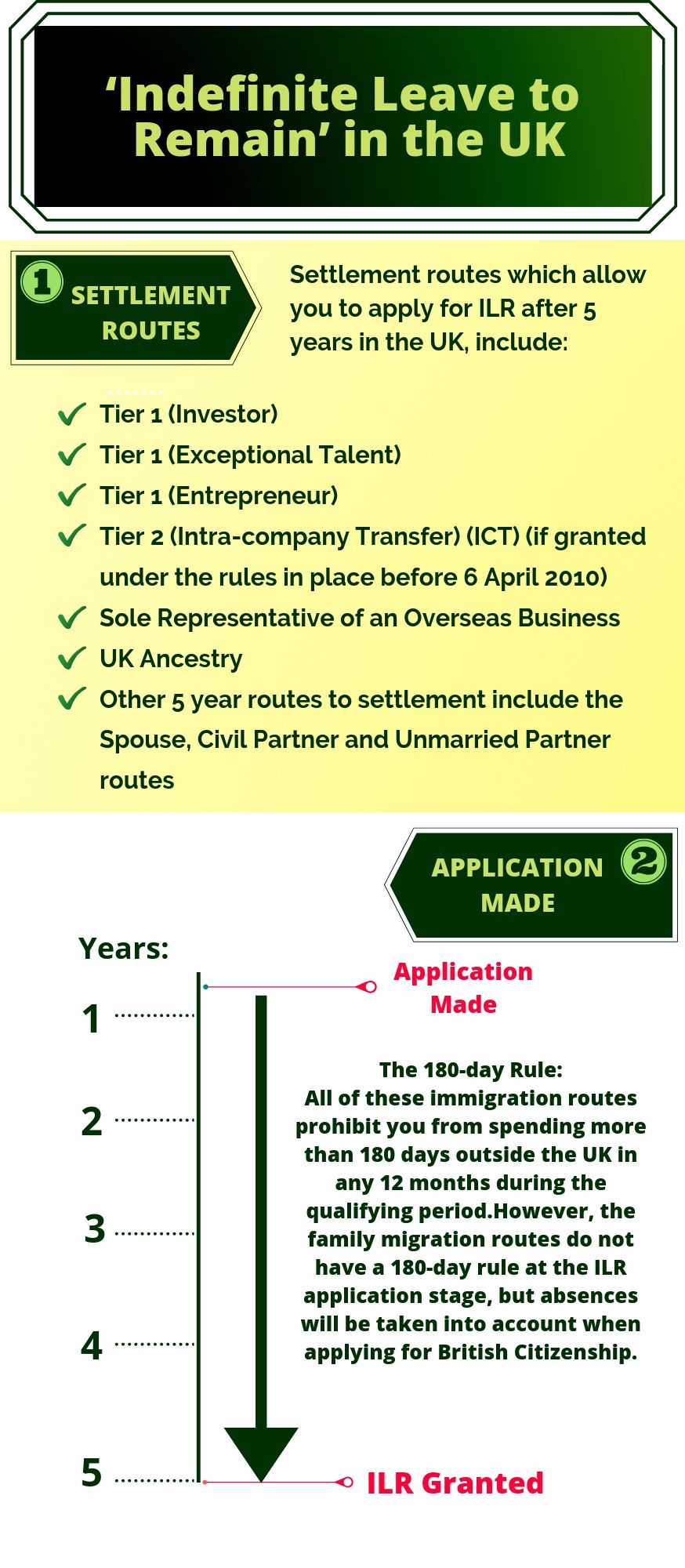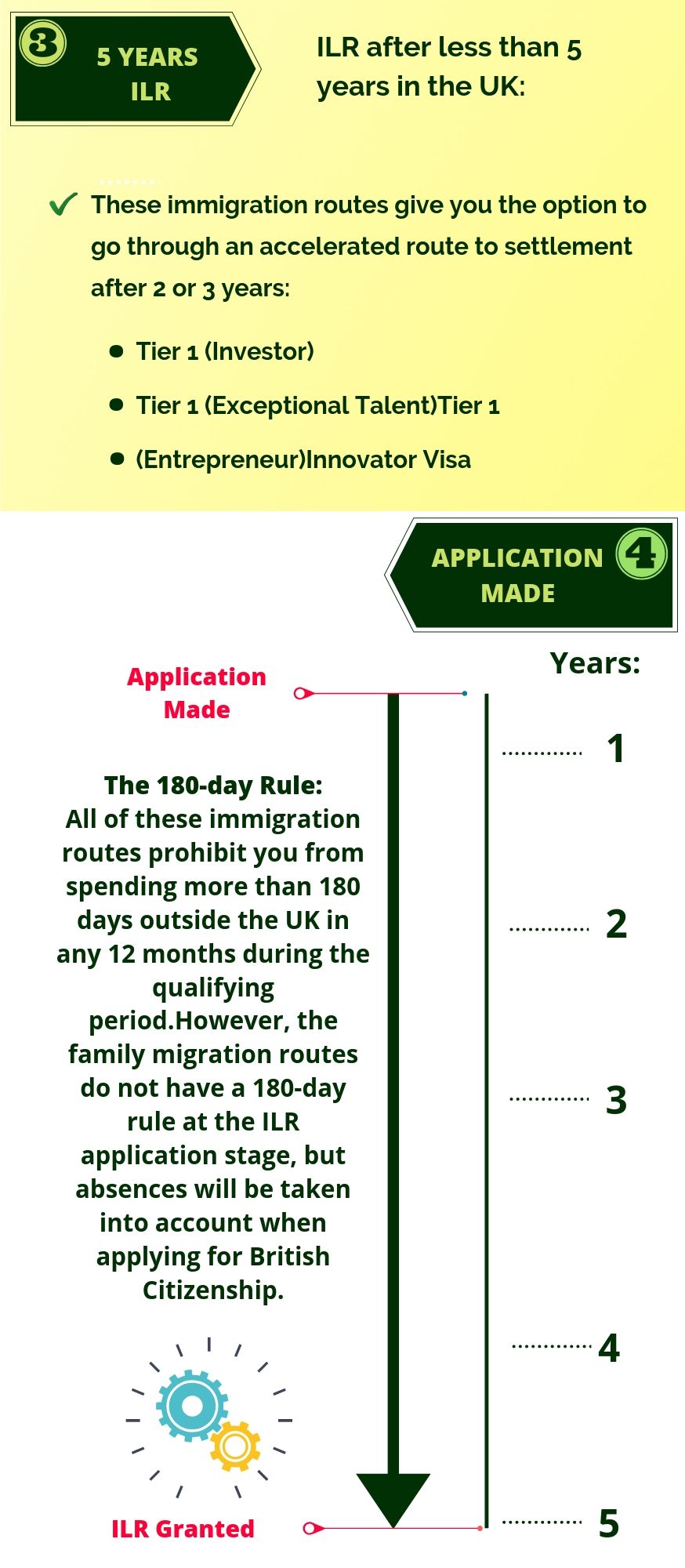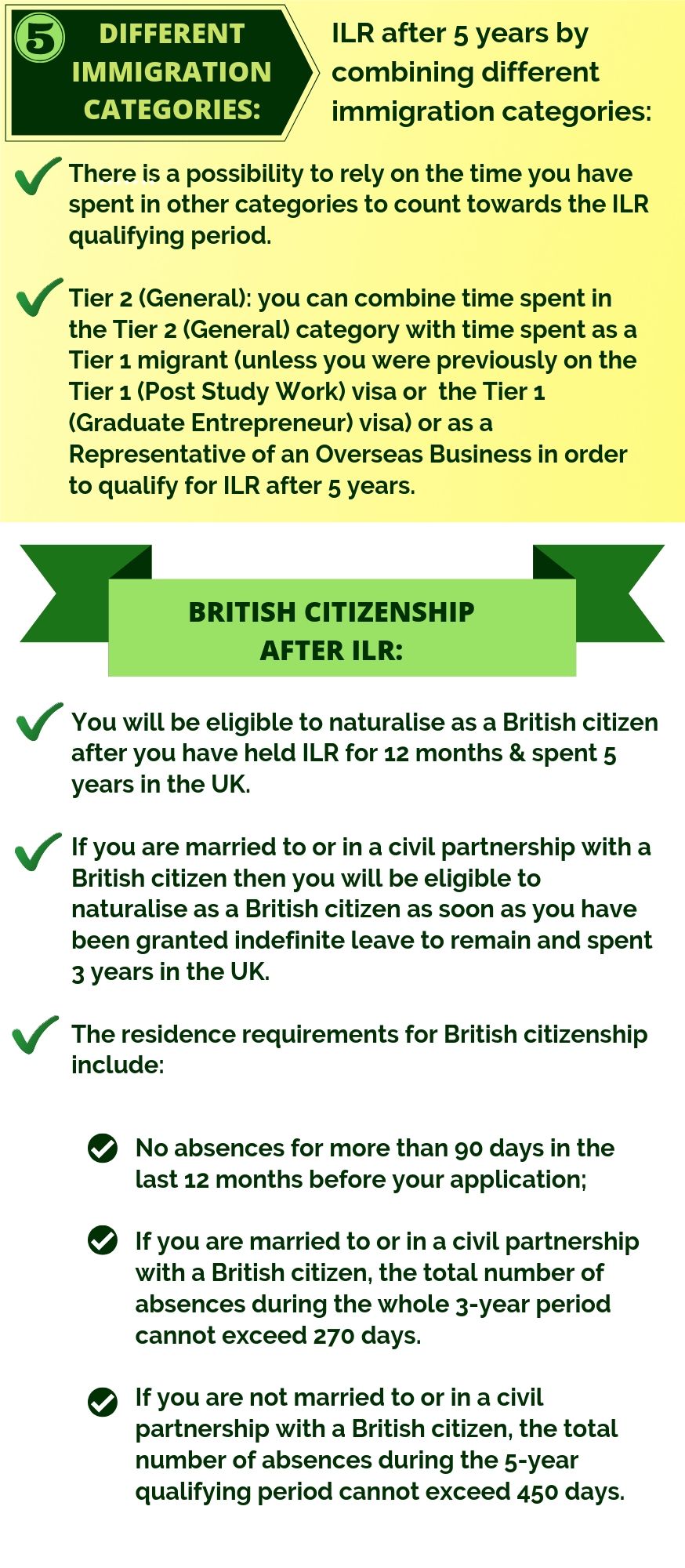INTRODUCTION
There are a few ways to be granted Indefinite Leave to Remain (ILR) in the UK. However, it is important to note the slight differences between each of the immigration categories and their requirements.




1. Settlement Routes ILR
This visa route gives you permanent residence after 3 years.
- Tier 1 (Investor)
- Tier 1 (Exceptional Talent)
- Tier 1 (Entrepreneur)
- Tier 2 (General) Skilled Worker
- Tier 2 (Intra-company Transfer) (ICT) (if granted under the rules in place before 6 April 2010)
- Sole Representative of an Overseas Business
- UK Ancestry
- Other 5 year routes to settlement include the Spouse, Civil Partner and Unmarried Partner routes.
- Further details regarding settlement can be found here.
2. Indefinite leave to remain after less than 5 years:
Indefinite leave to remain after less than 5 years:
These immigration routes give you the option to go through an accelerated route to settlement after 2 or 3 years:
- Tier 1 (Investor)
- Tier 1 (Exceptional Talent)
- Tier 1 (Entrepreneur)
- Innovator Visa
- Innovator visa: here, you are granted ILR, provided that you have spent 3 years lawfully in the UK. However, you are not able to use your time spent on the start-up visa to count towards those three years in the ILR qualifying period.
3. ILR after 5 years by combining different immigration categories:
ILR after 5 years by combining different immigration categories:
There is a possibility in relying on the time you have spent in other categories to count towards the ILR qualifying period.
- Tier 2 (General): you can combine time spent in the Tier 2 (General) category with time spent as a Tier 1 migrant (unless you were previously on the Tier 1 (Post Study Work) visa or the Tier 1 (Graduate Entrepreneur) visa) or as a Representative of an Overseas Business in order to qualify for ILR after 5 years
- However, if you are on the Tier 1 (Investor), Tier 1 (Entrepreneur) or the Innovator route, then you must complete the period of time as prescribed in those categories.
The 180-day Rule
- All of these immigration routes prohibit you from spending more than 180 days outside the UK in any 12 months during the qualifying period.
- However, the family migration routes do not have a 180-day rule at the ILR application stage, but absences will be taken into account when applying for British Citizenship.
How the 180-day rule is calculated
- For settlement applications made from 11 January 2018, absences from the UK are considered on a rolling basis, meaning that any consecutive 12 month period can be considered.
- It should be noted that where there are days of travel in which you have been in the UK for a part of that day, it will not be deemed an absence.
- If the 5 year period started before 11 January 2018, then any leave granted prior to that date will be assessed under the old rules.
- For dependant partners, any absences prior to 11 January 2018 will be disregarded. Any absences from 11 January 2018 onwards will be assessed on a rolling basis in the same way as the main applicant. Dependant children do not have to satisfy the 180-day ILR rule.
Excessive Absences
- Only under compelling reasons will the Home Office exercise discretion and allow excessive absences. There is no definition for ‘serious or compelling reasons’, but the Home Office guidance will grant ILR application to proceed if the excessive absences were due to;
- – Any serious illness which you or a close relative have suffered
- – A conflict
- – A natural disaster- such as volcanic eruption or tsunami
- If there are any compelling reasons for these absences, then you must provide evidence of this. The evidence should include a letter from you explaining the absence and additional evidence such as medical certificates, birth or death certificates or evidence of disruption to travel arrangements.
4. British Citizenship after ILR:
British Citizenship after ILR:
- You will be eligible to naturalise as a British citizen after you have held ILR for 12 months & spent 5 years in the UK.
- If you are married to or in a civil partnership with a British citizen then you will be eligible to naturalise as a British citizen as soon as you have been granted indefinite leave to remain and spent 3 years in the UK.
- The residence requirements for British citizenship include:
- No absences for more than 90 days in the last 12 months before your application;
- If you are married to or in a civil partnership with a British citizen, the total number of absences during the whole 3-year period cannot exceed 270 days.
- If you are not married to or in a civil partnership with a British citizen, the total number of absences during the 5-year qualifying period cannot exceed 450 days.
Check out these other useful resources by me on this topic
